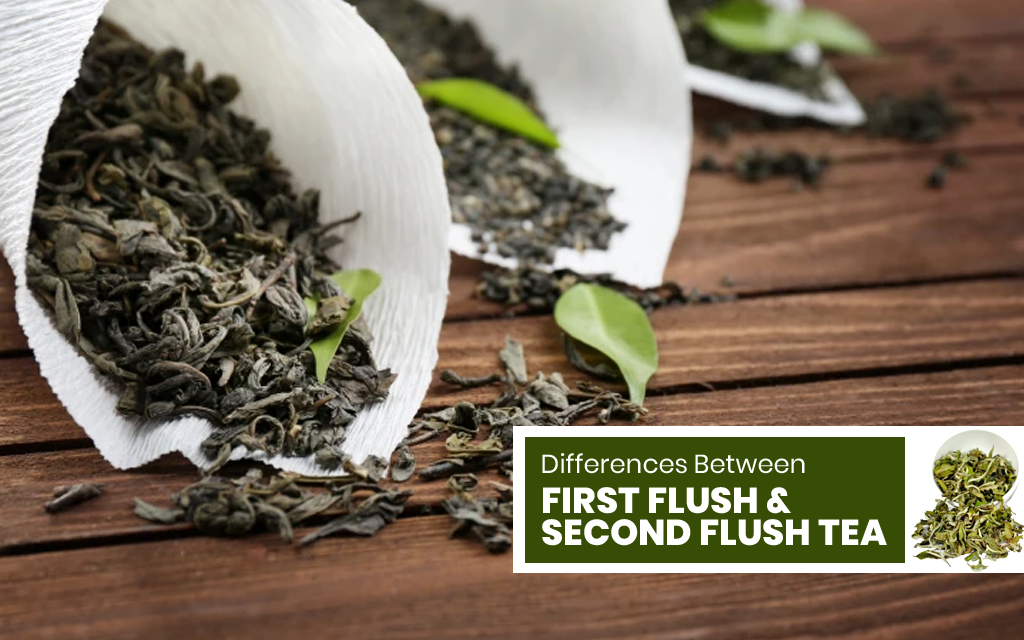
Differences Between First Flush and Second Flush Tea
When you are a tea enthusiast, the desire to learn more about this aromatic and delightful beverage comes naturally. So we do not find it surprising that you want to learn more about the first flush and second flush tea. After all, when you know more, you can sample more delicious options.
Darjeeling first flush teas are highly prized by tea connoisseurs around the world, and they can be quite expensive due to their limited availability and high demand. They are typically sold as loose-leaf teas and can be brewed using traditional methods such as steeping in hot water for several minutes.
The most interesting part about the first flush vs. second flush teas debate is that it goes down to the basics of tea farming. It discusses the seasonality of tea-loved blends and tries to evaluate why some can taste different at different times of the year.
First Flush 2024 Teas
What is a Flush?
When you are discussing flushes regarding tea, a flush refers to the harvesting of tea leaves.
What Type of Flushes are there?
Tea leaves are harvested at different points in the year. This detail has led to terms like first flush and second flush. There are three main types of flushes:
First Flush – The harvest period is late winter or early spring.
Second Flush – The second harvest occurs in June or July and is sometimes called the Summer Flush.The harvest period is late winter or early spring.
Autumn Flush – The final harvesting period of the year, the autumn flush, happens in October and November.
Differences between First Flush and Second Flush Tea
Due to the different harvesting times, there are some key differences between the first flush teas and the second flush teas. Following are the main differentiating factors:
1. The Period of Harvests
Since the first flush is harvested in spring, the tea leaves from this harvest grow in cooler temperatures. Since tea harvesting pauses completely during winters, the first flush is heavily anticipated and expensive.
The second flush teas grow in the warmth and sunlight of spring and summer, giving them vibrant and tasteful flavors. While it does not trigger the same reaction among people as its counterpart, it has its own set of benefits.
2. Nutritional Value
The first harvest of the season, the first flush teas, has the highest nutritional value compared to all other flushes. They are densely packed with nutrients and are the most effective in revitalizing people.
The second flush grows in the summer breeze with ample water and care. However, due to resource deletion after the first harvest, the second flush does not have the same nutritional value as the first flush teas.
3. Flavor
The first flush teas are incredibly rich in flavor and pack a punch of versatile tastes in the mouth when consumed. In contrast, the second flush has a full-bodied heavier taste compared to the first, giving it a unique aroma and signature slightly sweetish taste.
4. Color
Because first flush teas are harvested at the onset of spring, they tend to be lighter in color with a mild fruitiness natural tastes. In contrast, second flush teas are harvested in June and have bold and vibrant colors. You will likely see some amber tones in the second flush tea that are non-existent in the first flush.
Overall, we can safely see why people prefer one or the other when discussing the first flush.
Frequently asked questions
What do you mean by flush for teas?Flush refers to the plucking of a tea plant's harvest. First flush refers to the plucking of the first harvest in the springtime after the tea plants awaken from their winter dormancy. The second flush refers to the plucking of tea plants harvested after the first flush, typically in June.
First flush Darjeeling tea comes from the very first picking of the Darjeeling tea harvest season in spring, whereas the second flush comes from the second picking of the same plants in June. The first flush Darjeeling tea leaves are younger, more tender, and have a delicate flavor than the second flush.
The first flush tea typically contains more nutrients, caffeine, antioxidants, and flavor because they have more time to grow. Hence, first, flush tea is considered better. However, this isn't always the case. For example, most people consider the second flush Darjeeling teas better than first flush Darjeeling teas.
First, flush teas contain more caffeine and antioxidants. Therefore, they offer more energy and health benefits than second flush teas. This does not mean that second flush teas do not offer the same health benefits; they just offer a potency of the healthy contents.
First flush Darjeeling tea has a distinct, delicate flavor, including floral, earthy, and fruity notes. Tea connoisseurs often call it the 'Champagne of teas' because of its sweet, musky notes similar to Muscat wine.
The first flush Darjeeling teas are widely considered better than the second because of their delicate flavors and strong aromas.
While both Assam and Darjeeling are excellent flush teas, Darjeeling is widely considered the better of the two. Therefore, Darjeeling tea is popularly known as the best flush tea in the world.
Flush teas have delicate flavors that tea lovers prize. Therefore, we recommend not adding milk, sugar, or lemon. Such additives take away the original flavors and aromas of flush teas.
Conclusion
Our article briefly touches upon the disparities between teas, even the ones between teas that are of the same type, like Darjeeling.
Has this article put you in the mood for more tea? Order it immediately from our store and choose between the first and the second flushes to know how strong you want the resulting concoction to be.




























